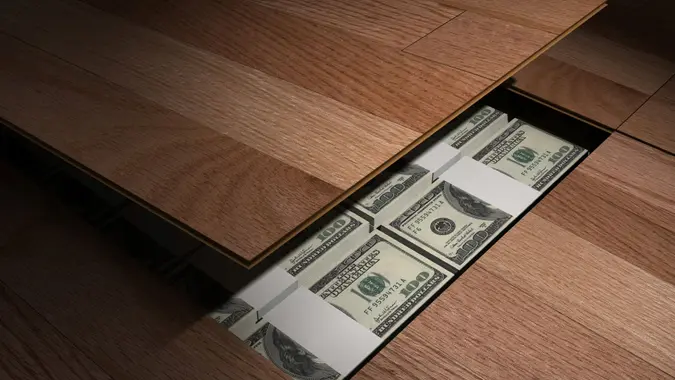Not Sure What To Do With Your Crypto? Let These 3 Experts Help You

Commitment to Our Readers
GOBankingRates' editorial team is committed to bringing you unbiased reviews and information. We use data-driven methodologies to evaluate financial products and services - our reviews and ratings are not influenced by advertisers. You can read more about our editorial guidelines and our products and services review methodology.

20 Years
Helping You Live Richer

Reviewed
by Experts

Trusted by
Millions of Readers
Though investing is an age-old tradition, cryptocurrency is a rather new asset class that many are still navigating. Whether you’re holding tons of unrealized gains from your crypto portfolio or just a few low market cap coins, you should still manage your holdings wisely. Here are some tips from crypto experts that can help.
Use a Trusted Exchange
You’ve undoubtedly heard of many fraudulent exchanges that have collapsed and taken crypto investors’ money with it. That’s why it’s important to use trusted and reputable exchanges for your transactions. Check for security features, user reviews, and regulatory compliance to ensure the trustworthiness of the exchange.
Secure Your Investments With Cold Storage
Storing your crypto in cold storage is one of the safest ways to protect your investments. Keeping your digital assets offline minimizes the risk of hacking and unauthorized access.
Optimizing Unrealized Gains
Mitch Naumann is a crypto expert and a co-founder at Cryptoquote.io. He suggested that people with substantial unrealized crypto gains take advantage of their equity with asset-backed loans. He said: “If an investor in digital assets needs cash and has gains in the market, they may want to look at using their assets as collateral to secure a loan. This approach offers liquidity without the need to sell their crypto.”
Understand Tax Implications
Take time to understand the tax implications of owning and trading cryptocurrencies in your country. Prioritize planning and reporting your crypto activities to avoid potential legal and financial troubles.
Shirin Bucknam is the founder of the Crypto Witch Club. “Buying crypto does not have any tax implications, but trading or selling crypto does! Crypto taxes can be confusing, especially if you’re a more advanced user and staking your crypto, receiving airdrops and rewards, or trading NFTs. Companies like CoinTracker are a necessity to ensure you’re tax compliant (and ensure any carry-forward losses are accounted for),” she said.
Don’t Underestimate Lesser-Known Altcoins
Naumann said, “Never say never when it comes to coins that currently have no utility or volume, as they can unexpectedly soar in value. While it’s generally wise to avoid going all-in on any coin outside of the top 20 by market cap, keeping a small, diversified portfolio of lesser-known coins can sometimes yield surprising returns.”
Though he doesn’t recommend you overload your portfolio with these coins, there’a wise way to go about acquiring them.
“It should be noted, though, that successfully investing in these coins requires a great deal of research and a strong understanding of market trends to identify potential hidden gems,” he explained.
Watch Out for Scams
Rosco Kalis is the founder of Revoke.cash, a crypto security product. He noted: “Scams and hacks are very prevalent in cryptocurrency, with billions of dollars being lost to scams and hacks yearly.”
“So one of the biggest things to look out for is making sure that you don’t lose your hard-earned crypto to hacks and scams. I would advise readers with large quantities of crypto to educate themselves about the best practices of staying safe in crypto, such as hardware wallets, managing token approvals and recognizing potentially harmful crypto interactions,” he added.
 Written by
Written by  Edited by
Edited by 























